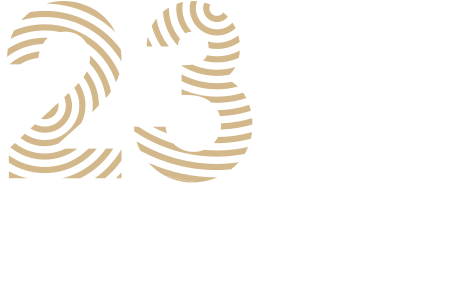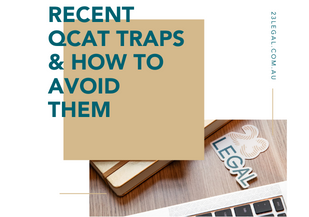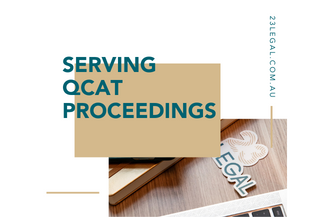
About 23Legal
September 25, 2022Why 23Legal?
October 11, 2022RECENT qcat traps & HOW TO AVOID THEM

The Queensland Civil and Administrative Tribunal (“QCAT”) is a Queensland based tribunal is well known for building and neighbourhood disputes (think arguments between neighbours over an overhanging tree or a fence line). In addition to these disputes, QCAT also hears minor civil and debt disputes, being disputes over a monetary amount less than $25,000.
QCAT is also a jurisdiction where having a lawyer represent you or your opponent is generally not allowed (unless you obtain permission of the Tribunal), such that it is a jurisdiction that many lawyers have limited exposure to. As a result of this, what you often find in QCAT disputes is self-represented parties attempting to navigate the Tribunal without any help or experience.
We have recently assisted some of our clients who have had claims brought against them in QCAT, and as a part of our engagement we have come across a number of traps and problems that parties to QCAT proceedings can fall into which can result in them missing deadlines or even having judgment entered against them.
Address for Service if you’ve had a claim started against you
The first big issue that we have come across recently is that the address for service QCAT will rely upon for the Respondent (that is the person getting sued/has the claim brought against them) is the address that is recorded in the Application Form by the Applicant (that is the person who is suing/bringing the claim).
A party’s address for service is the address that all documents in the QCAT proceeding need to be sent to. These documents range from the applications that commence a proceeding, interlocutory steps such as applications to adjourn a hearing, and Notice from QCAT directly.
What this means is that if the Applicant incorrectly records your address, or if you have moved addresses, you may not receive key documents from QCAT. This can very quickly become an issue because you may find yourself in a position where the other party to your proceeding or QCAT are attempting to serve documents on you at the incorrect address.
We have recently acted for a client who was issued a Hearing Notice by QCAT and, despite our client’s defence listing their correct address for service correctly, QCAT issued the Hearing Notice to the incorrect address that had been recorded by the Applicant. What this meant is that our client did not receive notice of the hearing date and but for a lucky coincidence where we found out about the hearing another way, our client would not have known the hearing was listed and it would have proceeded without them. Fortunately, we were able to quickly get across what was needed and push the hearing date back, but if we had not stumbled across the hearing date and let our client know the hearing would have proceeded without them.
It is important that you are aware of this so that you do not find yourself in a situation where you miss important dates or notices, such as hearing or application dates. If you do not update your address and important dates are missed, there is a risk that judgment can be entered against you or that steps, such as mediation, will be missed.
Through discussions with QCAT, we discovered that if you put a different address in your responsive forms (such as a defence or counterclaim), QCAT will not update their records to reflect this change, and parties need to manually update their addresses on the QCAT website themselves. QCAT will also only send you these documents via Post only (see more on this below) and not digitally or via email.
If you are a party to a QCAT proceeding and need to change your address, you can do so at this link.
If you have been served with QCAT proceedings, we recommend that you check your address that has been listed by the Applicant to ensure that it is correct. Further, if you change addresses throughout the proceeding it is important that you update your address for service. You should do this immediately if you are currently in a QCAT proceeding or if you are served with an application to ensure that all documents are sent to the correct address.
If you have any questions about this or are party to a QCAT proceeding generally, please contact us to discuss this further.
QCAT Important Notices
The second big issue that we have come across is that QCAT will issue important notices via post only, and will not issue these notices by email.
We have recently acted for a client who, due to postal issues, did not receive a Hearing Notice at all, such that the hearing was missed, and judgment was entered against them for the full amount being claimed.
If a judgment is entered against you, the consequences can be severe as you could face insolvency risks or enforcement measures and then have to go to the expense to have that judgment set aside which can be very costly and time consuming.
For more information about debt management and insolvency, see our Debt Management, Restructuring and Insolvency section of our Next Steps page.
If you are a party to a QCAT Hearing, it is your responsibility to ensure that you are regularly monitoring your postal address and, should you not hear from QCAT for a period of time, you should regularly follow up the registry to ensure that key documents or dates are not missed.
Conclusion
Due to the fact that QCAT is designed to be accessed by individuals without legal representation, it operates differently to other jurisdictions such as the Supreme and District Courts.
It is no doubt frustrating to people trying to access QCAT that they rely on post only as the means of notifying parties of hearing dates. Whilst there are historical reasons for this which we won’t delve into now, the failure to modernise and use a digital notification system significantly reduces the effectiveness of QCAT as a means of accessing the courts without lawyers; particularly given the postal difficulties which have been experienced over the past two years as a result of the COVID-19 Pandemic.
The key takeaway is that you should ensure your postal address is properly recorded with QCAT and that you are regularly monitoring your postal address to ensure that you receive all documents and notices filed with QCAT or served by QCAT/other parties to the proceeding.
If you have not received a notice from QCAT, or have otherwise had a judgment entered against you, we recommend that you seek legal advice urgently as the consequences could be severe.
Next Steps
If you have been served with QCAT Proceedings, or you wish to commence proceedings yourself, we are happy to discuss your options with you further so that you are equipped with the necessary information to properly deal with your claim.



